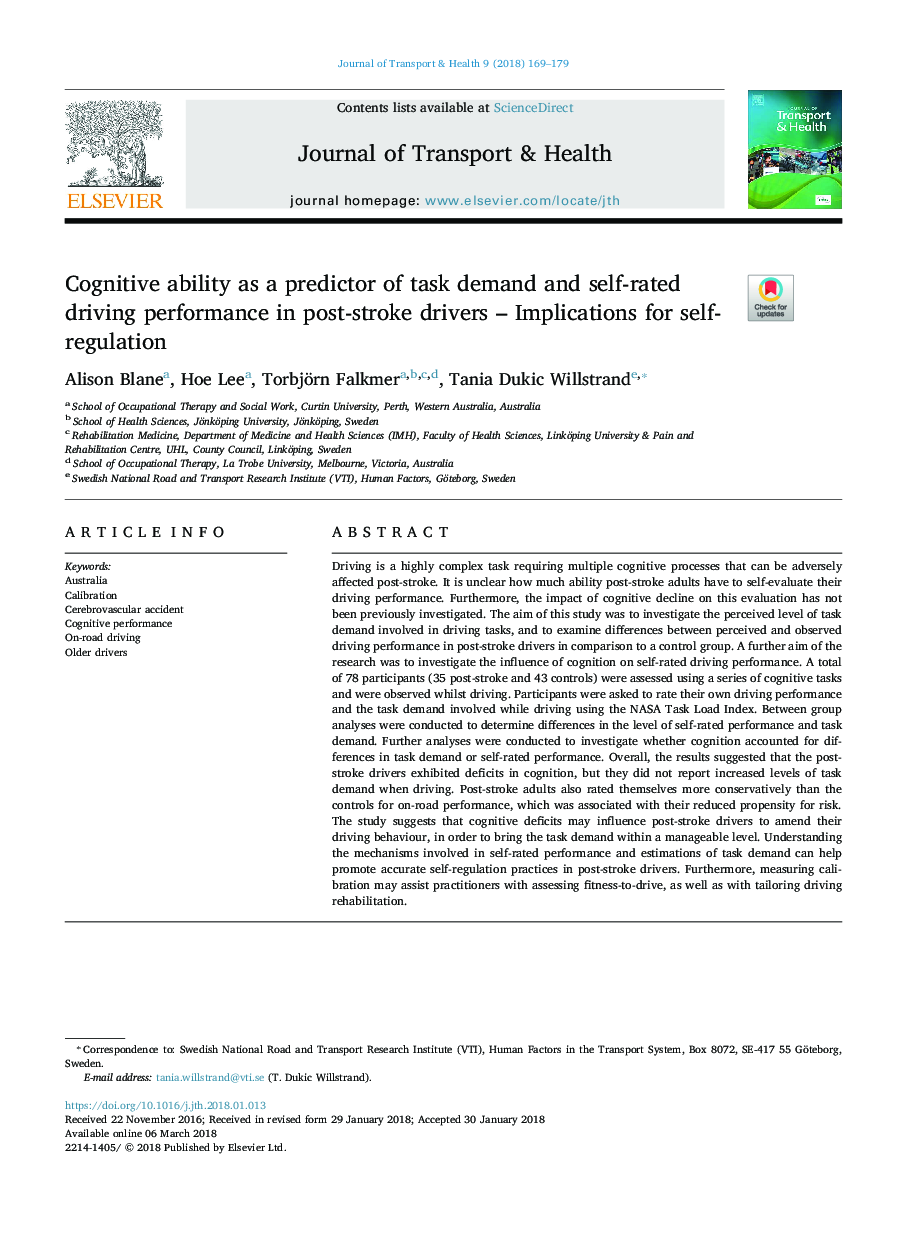| کد مقاله | کد نشریه | سال انتشار | مقاله انگلیسی | نسخه تمام متن |
|---|---|---|---|---|
| 7486907 | 1485449 | 2018 | 11 صفحه PDF | دانلود رایگان |
عنوان انگلیسی مقاله ISI
Cognitive ability as a predictor of task demand and self-rated driving performance in post-stroke drivers - Implications for self-regulation
ترجمه فارسی عنوان
توانایی شناختی به عنوان یک پیش بینی کننده از تقاضای کار و عملکرد رانندگی خود در رانندگان پس از سکته مغزی - پیامدهایی برای خود تنظیم
دانلود مقاله + سفارش ترجمه
دانلود مقاله ISI انگلیسی
رایگان برای ایرانیان
کلمات کلیدی
استرالیا، کالیبراسیون، تصادف مغزی عملکرد شناختی، رانندگی در جاده، رانندگان قدیمی،
ترجمه چکیده
رانندگی یک کار بسیار پیچیده است و نیاز به فرآیندهای شناختی چندگانه دارد که می تواند پس از سکته را تحت تاثیر قرار دهد. مشخص نیست که چه قدر بزرگسالان پس از سکته می توانند عملکرد رانندگی خود را ارزیابی کنند. علاوه بر این، تأثیر کاهش شناختی بر این ارزیابی قبلا مورد بررسی قرار نگرفته است. هدف از این مطالعه بررسی میزان درک سطح تقاضای کار درگیر در انجام وظایف رانندگی و بررسی تفاوت بین عملکرد رانندگی درک شده و مشاهده شده در رانندگان پس از سکته مغزی نسبت به گروه کنترل است. هدف دیگر این تحقیق، بررسی تأثیر شناختی بر عملکرد خودکار رانندگی است. در مجموع 78 نفر (35 پس از سکته و 43 مورد) با استفاده از یک سری از وظایف شناختی و در هنگام رانندگی مشاهده شدند. شرکت کنندگان از خواندن رانندگی و تقاضای کارشان در هنگام رانندگی با استفاده از شاخص بارگذاری ناسا در نظر گرفتند. بین تجزیه و تحلیل گروه ها برای تعیین تفاوت در سطح عملکرد و تقاضای کار خود ارزیابی شد. تجزیه و تحلیل های بیشتر برای بررسی اینکه آیا شناخت به تفاوت در تقاضای کار و یا خود ارزیابی عملکرد انجام شده است انجام شد. به طور کلی، نتایج نشان داد که رانندگان پس از سکته، نقص در شناخت را نشان می دهند، اما در هنگام رانندگی، میزان افزایش تقاضای کار را گزارش نمی کنند. بزرگسالان پس از سکته همچنین خود را نسبت به کنترل های عملکرد جاده ای محافظه کارانه تر نشان دادند، که با کاهش میل به ریسک همراه بود. این مطالعه نشان می دهد که نقص شناختی ممکن است بر رانندگان پس از سکته تاکید کند تا رفتار رانندگی خود را اصلاح کنند تا بتوانند تقاضای کار را در یک سطح قابل کنترل قرار دهند. درک مکانیسم های درگیر در عملکرد خود ارزیابی و برآورد تقاضای وظیفه می تواند به ارتقای شیوه های خودمراقبت دقیق در رانندگان پس از سکته کمک کند. علاوه بر این، اندازه گیری کالیبراسیون ممکن است به تمرینکنندگان کمک کند با ارزیابی تناسب اندام برای رانندگی، و همچنین با توانبخشی رانندگی خیاطی.
موضوعات مرتبط
علوم پزشکی و سلامت
پزشکی و دندانپزشکی
سیاست های بهداشت و سلامت عمومی
چکیده انگلیسی
Driving is a highly complex task requiring multiple cognitive processes that can be adversely affected post-stroke. It is unclear how much ability post-stroke adults have to self-evaluate their driving performance. Furthermore, the impact of cognitive decline on this evaluation has not been previously investigated. The aim of this study was to investigate the perceived level of task demand involved in driving tasks, and to examine differences between perceived and observed driving performance in post-stroke drivers in comparison to a control group. A further aim of the research was to investigate the influence of cognition on self-rated driving performance. A total of 78 participants (35 post-stroke and 43 controls) were assessed using a series of cognitive tasks and were observed whilst driving. Participants were asked to rate their own driving performance and the task demand involved while driving using the NASA Task Load Index. Between group analyses were conducted to determine differences in the level of self-rated performance and task demand. Further analyses were conducted to investigate whether cognition accounted for differences in task demand or self-rated performance. Overall, the results suggested that the post-stroke drivers exhibited deficits in cognition, but they did not report increased levels of task demand when driving. Post-stroke adults also rated themselves more conservatively than the controls for on-road performance, which was associated with their reduced propensity for risk. The study suggests that cognitive deficits may influence post-stroke drivers to amend their driving behaviour, in order to bring the task demand within a manageable level. Understanding the mechanisms involved in self-rated performance and estimations of task demand can help promote accurate self-regulation practices in post-stroke drivers. Furthermore, measuring calibration may assist practitioners with assessing fitness-to-drive, as well as with tailoring driving rehabilitation.
ناشر
Database: Elsevier - ScienceDirect (ساینس دایرکت)
Journal: Journal of Transport & Health - Volume 9, June 2018, Pages 169-179
Journal: Journal of Transport & Health - Volume 9, June 2018, Pages 169-179
نویسندگان
Alison Blane, Hoe Lee, Torbjörn Falkmer, Tania Dukic Willstrand,
